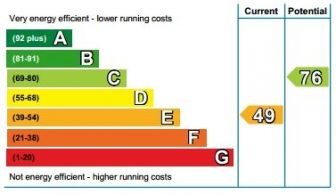 Nearly one fifth of UK landlords (18%) still have commercial properties with an energy performance certificate (EPC) rating of F or G, according to research by RSM UK.
Nearly one fifth of UK landlords (18%) still have commercial properties with an energy performance certificate (EPC) rating of F or G, according to research by RSM UK.
The audit, tax and consulting firm’s findings are a cause of concern for the sector, with new legislation coming into force on 1 April 2023 stating that commercial let properties must have a minimum EPC rating of E by this date.
The government has further ambitions to make it unlawful to let commercial property below an EPC B rating by 2030. However, findings from RSM’s annual Real Estate 360 survey show that 52% of landlords did not consider these timelines achievable for the majority of commercial property owners. Just over a third (36%) of respondents believed the timelines to be achievable, while 12% remained unsure on the outcome.
Additionally, 40% of real estate businesses confirmed they had written plans and strategies in place relating to their environmental, social and governance (ESG) commitments, whereas 44% confirmed they didn’t have ESG strategies.
However, more positively, 30% of respondents slightly or strongly disagreed that the UK’s real estate sector is making quick enough progress to reduce its carbon footprint in line with the UK government’s net zero targets, down from 39% the previous year. Similarly, 41% of businesses surveyed slightly or strongly agreed that enough was being done, a slight (4%) increase on the previous year.
More than a third (43%) of landlords believed that the government’s attitude towards making progress on environmental goals would encourage them to act on investing in ESG friendly solutions, with 58% also completely or somewhat understanding the ESG agenda.
Conversely, landlords perceived the biggest barrier to decarbonising the real estate sector to be lack of landlord willpower to invest in environmentally solutions (33%), the impact of the energy crisis (32%), and the lack of cost-effective tech solutions (30%).
Stacy Eden, partner and head of real estate at RSM, commented: “Our Real Estate 360 survey highlights the real challenges landlords are currently facing, with the focus on the ESG agenda both presenting an opportunity to innovate as well as barriers to overcome.
“Although it is encouraging to see landlords respond well to the government’s approach on environmental solutions so far, there remains real concerns, especially with landlord willpower being the biggest barriers to decarbonisation.
“More worryingly, almost one fifth of landlords own commercial property which will be deemed unlawful to let as of April 2023, which has further implications for landlords and their income streams. With further EPC legislation expected to arrive by 2030, government support is needed, or we could start to see a black hole in the rental market.”


“Brushing under the table time” this will show how the Government will react to this whole mess, many longtime commercial units have not even carried out an EPC and as article says 20% are F or G, my guess nothing will happen.
You must be logged in to like or dislike this comments.
Click to login
Don't have an account? Click here to register
This ‘ Conservative ‘ government is doing arguably as much harm to business as Labour could ?
There needs to be a programme of energy improvement that is economically, technologically, viable Tat means Tax funding.
The aspirations of efficiency are laudable, but time-scales totally unrealistic.
You must be logged in to like or dislike this comments.
Click to login
Don't have an account? Click here to register
How can you make a metal frame shed (warehouse) used for storage more energy efficient?
For H&S reasons it will have a bit of lighting & probably an inline electric water heater in the loo, plus wall mounted electric convector heaters in a tiny little site office (if even that).
It won’t need to be insulated because it doesn’t need to be. In many cases the site office might be used one day a week or perhaps once a month.
The warehouse unit is precisely as energy efficient in operation as it needs to be. Upgrading elements of it are completely unnecessary as the embedded carbon that is being replaced will never be reclaimed within the operational lifespan of the unit.
Unfortunately the EPC system is great for an average property but is fairly useless for some properties.
You must be logged in to like or dislike this comments.
Click to login
Don't have an account? Click here to register